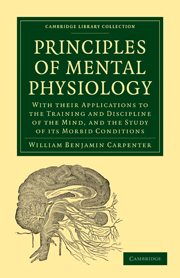 Principles of Mental Physiology
Principles of Mental Physiology Book contents
- Frontmatter
- PREFACE
- Contents
- BOOK I GENERAL PHYSIOLOGY
- CHAPTER I OF THE GENERAL RELATIONS BETWEEN MIND AND BODY
- CHAPTER II OF THE NERVOUS SYSTEM AND ITS FUNCTIONS
- CHAPTER III OF ATTENTION
- CHAPTER IV OF SENSATION
- CHAPTER V OF PERCEPTION AND INSTINCT
- CHAPTER VI OF IDEATION AND IDEO-MOTOR ACTION
- CHAPTER VII OF THE EMOTIONS
- CHAPTER VIII OF HABIT
- CHAPTER IX OF THE WILL
- BOOK II SPECIAL PHYSIOLOGY
- APPENDIX. DR. FERRIER'S EXPERIMENTAL RESEARCHES ON THE BRAIN
- INDEX
CHAPTER I - OF THE GENERAL RELATIONS BETWEEN MIND AND BODY
Published online by Cambridge University Press: 29 August 2010
- Frontmatter
- PREFACE
- Contents
- BOOK I GENERAL PHYSIOLOGY
- CHAPTER I OF THE GENERAL RELATIONS BETWEEN MIND AND BODY
- CHAPTER II OF THE NERVOUS SYSTEM AND ITS FUNCTIONS
- CHAPTER III OF ATTENTION
- CHAPTER IV OF SENSATION
- CHAPTER V OF PERCEPTION AND INSTINCT
- CHAPTER VI OF IDEATION AND IDEO-MOTOR ACTION
- CHAPTER VII OF THE EMOTIONS
- CHAPTER VIII OF HABIT
- CHAPTER IX OF THE WILL
- BOOK II SPECIAL PHYSIOLOGY
- APPENDIX. DR. FERRIER'S EXPERIMENTAL RESEARCHES ON THE BRAIN
- INDEX
Summary
1. The Conscious Life of every individual Man essentially consists in an action and reaction between his Mind and all that is outside it,—the Ego and the Non-Ego. But this action and re-action cannot take place, in his present stage of existence, without the intervention of a Material Instrument; whose function it is to bridge over the hiatus between the individual Consciousness and the External World, and thus to bring them into mutual communication. And it is the object of this Treatise to take up and extend the inquiry into the action of Body upon Mind, as well as of Mind upon Body, on the basis of our existing knowledge; so as to elucidate, as far as may be at present possible, the working of that Physiological Mechanism which takes a most important share in our Psychical operations; and thus to distinguish what may be called the automatic activity of the Mind, from that which is under volitional direction and control.—This inquiry has been started more than once, but has not until recently been systematically prosecuted. “There is one view of the connection between Mind and Matter,” says Prof. Dugald Stewart, “which is perfectly agreeable to the just rules of philosophy. The object of this is, to ascertain the laws which regulate their union, without attempting to explain in what manner they are united.
- Type
- Chapter
- Information
- Principles of Mental PhysiologyWith their Applications to the Training and Discipline of the Mind, and the Study of its Morbid Conditions, pp. 1 - 28Publisher: Cambridge University PressPrint publication year: 2009First published in: 1874


